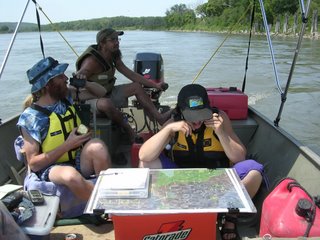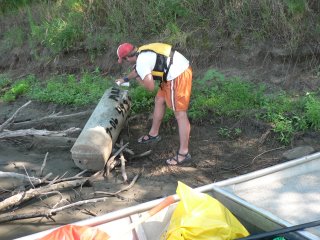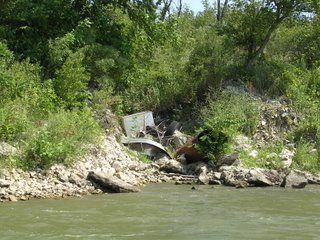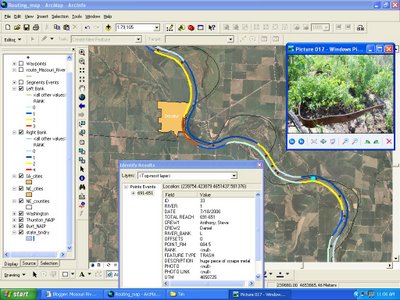
Starting at home


On July 16, 2006, Missouri River Relief began traveling down the Missouri River on a 754-mile journey by boat from Ponca State Park, NE, to the Mississippi in St. Louis. The purpose of this “MegaScout” journey was to map trash deposits along the Missouri River, creating a digital map database that can be used to plan river clean-ups, provide information useful to local organizations and to create a network that can be used by communities along the river.



Still basking in the good vibes (and bodily exhaustion) of Saturday’s clean-up in
Fairly soon, a strange sign caught our eye –
“Free Mud Rubs”
Of course, we immediately knew where we were …good ol’ Alligator Cove, with Capt. John Breyfogle hailing us from his kayak. We stopped by for hugs from John, Janie, Stew and
With the sun above and the fall breeze in our faces, we were home on the river again. Anyone sitting on the banks may have wondered why these goofballs in their jon boats were whooping like coyotes.
Passing the miles that we cleaned up on Saturday was incredibly fulfilling, until we saw a few spots that we weren’t able to get crews to. This river-cleaning business requires an unbelievable optimism and a faith in the future responsibility of river lovers everywhere.
Not the case, as the MegaScout showed us.
-Steve Schnarr
Becoming Trash Scientists
 As our boats move downstream, each boat scouts a bank of the river. The crews on board scan the shore with binoculars while the boat pilot checks out the big picture. The conversation is, admittedly, a little boring:
As our boats move downstream, each boat scouts a bank of the river. The crews on board scan the shore with binoculars while the boat pilot checks out the big picture. The conversation is, admittedly, a little boring:
Scout: “Is that a log or a hot water heater?”
Pilot: “I can’t tell. Let’s go check it out” (Boat swings behind wing dike. An electric whine as pilot tilts boat motor. A heron spreads its wings and vacates the area with an annoyed squawk.)
Scout (squinting through binocs): “It’s a hot water heater. Can you get in there?”
(Pilot shrugs, and Scout moves to the bow of the boat, probing the depth of the water with a canoe paddle as the boat moves to shore. As they land, Scout hops ashore, takes a digital photo of the heater, marks the point on handheld GPS unit, and approaches the appliance with a spray paint can.)
 refrigerators coming from? How far do they travel? Finally, Charlotte Overby came up with the idea of spray-painting the river mile, date, and MRR on the backside of appliances. We know that high water will lift many of these huge objects again, sending them further downstream. We are hoping that, either in river clean-ups or by talking to people who spend time on the river, we’ll find out where some of these things end up and how long it takes them to move.
refrigerators coming from? How far do they travel? Finally, Charlotte Overby came up with the idea of spray-painting the river mile, date, and MRR on the backside of appliances. We know that high water will lift many of these huge objects again, sending them further downstream. We are hoping that, either in river clean-ups or by talking to people who spend time on the river, we’ll find out where some of these things end up and how long it takes them to move.
This is the scale:
0 Clean to rare small trash
1 Scattered small trash
2 Small trash scattered & occasionally in concentrations
3 Like 2 but with occasional large trash
4 Frequent concentrations of trash, scattered large trash
5 Freq. concentrations,large trash &/or dumps
Scout: “What do you think, a 2?”
Pilot: “I don’t know. There wasn’t much small stuff, but there were those barrels and that refrigerator and that boat access was pretty trashed. I think it’d be a 3”
Scout: “I agree.” (bends over data sheet and scribbles entry: “3 barrels, refrigerator, small trash at boat access, less small trash rest of the mile”)
(573) 443-0292
email: riverrelief@riverrelief.org
website: www.riverrelief.org
Crew Completes First Leg of Mega-Scout
A wonderful week comes to an end – Melanie Cheney
The River Refuge at Alligator Cove
River Mile 343
So here we are at Alligator Cove on our last day of the trip. Stew Miller and Janie Breyfogle cooked a lovely organic breakfast with coffee, espresso, and the works! A big thanks to Captain Brey who allowed a bunch of stinking, low energy, river rats camp at his wonderful place for two nights! It was great.
We boated up river Saturday morning to La Benite Park for our Boats & Brauts event (or as we've been calling it, Boats and Brats...after our own moody & grumpy selves.) Vicky and Mike Richmond helped put together an awesome event. Being a native plant person, I was so pleased that there were native plant people there, and rain garden extraodinaire's. They auctioned off some beautifully painted rain barrels by local artists, while our guys took people out on boat rides. In the meantime, the rest of us lounged around in the shade eating brauts, listening to music, and watching some really talented jugglers who rode around on unicycles.
As it wound down, I wanted to get out on a boat. Tim told me I was welcome to take one out if I felt ready enough to become a certified boat driver. After months of training, and a week of navigating this unpredictable river, I told him I was ready.
Stew hopped in with me, and then 5 people came walking down the bank. These people included organizers, Blue River people, the guitarist and one of the jugglers. I was thrilled to be able to take them out on the river, some who had never even been out on it in a boat! It was so exhilarating and cool. We had great conversation about our natural resources and what we do. The ride was incredibly smooth and pleasurable, one I will never forget.
Back at camp, everyone went into lounge mode, now that we were officially done doing good deeds. Anthony caught the fishing bug, and finally caught himself a catfish. And Tim & Dan slept in front of the Cardinal's game, one slumped over in each direction, looking like they were dead.
Stew never took a break, preparing for his dinner for 40. Some friends of Alligator Cove pulled a bbq grill up, and helped cook. They actually cooked us steaks to order! So tasty, we stuffed ourselves silly. Mike Richmond gifted me with a pint of Jim Beam and we passed it around.
After dinner we all meandered down to the boat dock for a sunset cruise. Anthony was of course already in the boat, as he had become one with the boat over the two weeks. If he wasn't driving it around, he was sitting in it , fishing off of it, or sleeping in it. Heidi finally made it in, and they were out tooling around in the cove. Out of the blue, and much to Heidi's surprise I'm sure, a crazy fish (flying carp) jumped in the boat. Heidi quickly moved to the front as we all yipped and hollered from shore. While Boudreaux got his whacking stick out attempting to whack the flopping massive fish, Heidi couldn't take it anymore and dove off of the boat, head first, clothes and all. It was hilarious! Unfortunately, my life jacket got slimed in the process. Uggghhhh!
After waiting around for everyone, we finally took the Saskia, the Char, and the Stous' houseboat upriver to a big sandbar we had camped on 2 nights before and played like children in the big muddy river one last time.
We headed back to Alligator Cove, navigating the dark river exquisitely, and watched the setting crescent moon. Later we all ended up on the deck overlooking the water, and had a really nice circle session, in which we went around and praised each other and what we do, passing the maple twig.
What an amazing experience and chance of a lifetime. I've learned and experienced so much, sharing this life energy with my closest friends, and my beloved Big Muddy. Instead of feeling drained and worn out like most of the crew, I came back energized and happy.
Some thoughts on our crew – Melanie Cheney
River Mile 380, above
Dave and Fran Stous have been a wonderful addition to the crew, patiently trailing along with us and hanging out. The original plan was for their houseboat to be the mothership, but plans quickly change on the river, and we had everything covered. So they were wanting to do something more for us, although contented just to be on the river and going along for the ride.
We gave them the important task of sending out messages in a bottle, which is a great job, and Fran began to write our daily messages along with the information we had already printed out about the megascout.
They are such a wonderful and cute couple. Did I mention that they are wonderful? Fran is a psychiatric nurse (that makes 2 with  inquisitive and knowledgeable. Dave is a water quality engineer and geologist. He answers many of our questions and tells us about the water treatment & power plant outflows. Too cool. He's also a great captain & navigator, as well as on the board of River Relief. Incredible people.
inquisitive and knowledgeable. Dave is a water quality engineer and geologist. He answers many of our questions and tells us about the water treatment & power plant outflows. Too cool. He's also a great captain & navigator, as well as on the board of River Relief. Incredible people.
Then there is Dan, our GIS intern, world traveler, dynamite guy, smart, funny, and totally fits in with the crew and can do anything. Aside from that, he primarily keeps track of the data, photos, & megascout database with maps & all on his laptop Betty. This week, he got a phone call on a sandbar near

 every pocket and crevice and fold. Fabrics absorb the river humidity and the sun dries them quickly. Our bodies are brown from the unending bake of the sun. We swim to cool down, and the river mud enters our pores.
every pocket and crevice and fold. Fabrics absorb the river humidity and the sun dries them quickly. Our bodies are brown from the unending bake of the sun. We swim to cool down, and the river mud enters our pores.Contemplations About the River’s Present and Future
On heat waves, sandbars and millipedes – Melanie Cheney
River Mile 421, below
We set up camp on a gorgeous sand bar, continuing our nightly ritual. As the sun set, a bright and already huge white cumulus cloud grew before our very eyes, turning into a monstrous and brilliant pink anvil. We chattered the night away, and sang ourselves to sleep under the clouds, despite the 30% chance of rain. Well, the lightning caught Dan & I's attention at once, and we set up his supposedly 4-man tent in no time. Then we allowed the steady wind to lull us back to sleep, outside. It was just too hot to sleep in a tent. So when it started raining, we reluctantly crawled into the moist and sandy tent, calling to Anthony who was also sleeping nearby outside. The 3 of us couldn't help but giggle loudly at our impending situation. It was a rough night for all of us.



One of the great pleasures of this mapping trip has been living with and exploring with such an interesting and talented crew of trash scientists. We are all on this trip because we love the Missouri River and want to know it more deeply. That is a bond that can’t be broken by simple campsite squabbles, and our bond has grown deeper as the river miles pass by.
The Past Week MO River Relief Crew:
 The new crew has been assembled. This week we have the only 6 of us. Anthony, Daniel, Tim, Steve, Mel, and Sienna.
The new crew has been assembled. This week we have the only 6 of us. Anthony, Daniel, Tim, Steve, Mel, and Sienna.
 Early morning data entry with Dan, Mel, and lots of coffee.
Early morning data entry with Dan, Mel, and lots of coffee.
First leg down... off to Kansas City.
Observations from the river by Vicki
I’m not much of a journal writer, but have found myself with a notebook full of incomplete sentences. Snapshots of a week that has rubber-band stretched and snapped into real time.
Boat Day one
We’re getting good at this! Each member of the crew has a niche. Comic relief, food prep, dishes, firebuilder, get the chairs, enter the data all come together daily in an organic way. No one wants for anything. Companionship, solitude- take your pick. The opportunity changes daily.
We board the boats and make our nests. Before two miles have passed we are in the rhythm that will take us through that day. We employ the “dog look”, snapping our heads back and forth. River miles are instinctive now. We know where we are in space.
We relax into the day and begin to notice things. A brick house- the first I’d seen. How did someone schlep those over the plains? Bright pockets of sun through the cottonwoods, just enough to warm the flowers that make riotous spots of color in the green.
Boat Day two
The animal people. Otters on the bank near a grain elevator. Bald eagles flying over the power plant. Signs of beaver everywhere.
Much has been written about the herons that we see. At first they were shy birds, flapping off at the first sign of our boats. In the urban areas, they are acclimated and merely look at us as we power by.
The flies. The vampire flies, says Anthony. So gentle, says Daniel. Biting, nasty, tenacious flies. Ground crew saw to our comfort by supplying swatters for both boats.
We can tell when we motor past public land. The cottonwoods drape the river. It is greener and cooler.
I don’t dare scan the other bank, I’d be lost. It is enough to know I’m immersed in “my” side.
Day three
We are fortunate to live in this time. Aren’t we lucky, says
The reporter who had never been to the ramp and needed directions from a boat full of grimy river rats from hundreds of miles away.
The chevrons are new and have covered the trash that has accumulated. Have we not yet had the water to deposit the trash? Steve notices that there is driftwood piled along the rock. Perhaps the bottles and cans haven’t yet made it to this place.
A message in a bottle has been dropped daily, the brain child, and pseudo science of Michael. We caught up with that bottle down stream. The bottle got an earlier start than our boats did. It covered 10 miles in the four hours since we threw it in. It feels strange to be throwing trash into the river. I feel a bit self conscious doing it. It feels more like weird science now. A call to Michael to tell him. Science at work!!
Missouri River Relief Megascout
 Thursday, July 20, 2006
Thursday, July 20, 2006We camp on beautiful sandbars with refreshing swimming holes ; the cottonwoods rise high behind us and sing the wind through their leaves; we take turns making wonderfully tasty dinners; and tell stories late into the night.
Most of us sleep out under the twinkling stars and rise with the cool morning sun. The hiss of the Coleman stove indicates that coffee is on ……one by one the crew arises, stuffs their bags, and starts the methodical migration back to the boats.
Most days start with a brief roundtable about the day to come. We pour over the maps and decide how far we will go. The ground crew makes lists of things the group needs, and gathers writings to pass onto the BLOG.
Media contacts for the day are discussed. Man, have we had good media exposure; 5 TV stations have come out to do stories and a couple of Newspapers. Most of the people we meet have heard of us. The attitudes of the locals indicate a connection to the river and an appreciation of what River Relief does. Does our souls good.
And the mapping of trash is becoming clockwork. We follow our route on fine maps with river  miles, towns, roads, accesses and public lands laid deftly on top of air photos. The banks are scanned with naked eyes and binoculars. All concentrations of trash are located with GPS and all reaches are given a trashiness ranking. This all comes together in a database that allows us to show the patterns in trash abundance.
miles, towns, roads, accesses and public lands laid deftly on top of air photos. The banks are scanned with naked eyes and binoculars. All concentrations of trash are located with GPS and all reaches are given a trashiness ranking. This all comes together in a database that allows us to show the patterns in trash abundance.
The sun beats down and our tans grow darker. Lovely swimming holes are frequented often to cool our bodies and freshen our minds. Our list of wildlife encountered is growing…..terns, eagles, otters, deer, turkey, and jumping carp amongst many species.
Yet the most interesting species are the humans that cross our path. Interested, red-nosed faces at a Rulo Catfish pub; friendly greetings from the Ponca State Park camp maintenance man; cute TV news girls and their graceful high heeled river rides; enthusiastic Donna at the Sioux City Chamber of Commerce; a family of Omaha Indians that enjoyed their first Missouri River boat ride; barge captains and Marina gas girls; crusty fishermen; and the numerous waving folks passing by in a variety of boats. All make us feel proud to be on the Mega-scout.
They do all flow together into a feeling of satisfaction; that we dared to undertake such an adventure; that it is going so well; and that there is another 600 miles to go……..


Every river mile on both the left and right side of the river have been rated for trash on a 0-5 scale. Zero being no or little trash, and five being large dumps. So far we have found only small scattered trash. Every point (trash, ramp, point of interest) we marked along the river is linked with a photo caption and description for easy access.
 Around the 672 mile marker we met up with Captin Hal of the "Slim Funk". Hal and his team are from the USGS River Studies in Columbia, MO. They are working on velocity measurements of wing dikes and fish studies. Hal, Rob, Chad, and Sarah joined the River Relief on a sandbar for dinner and revelry. They are a great bunch, after smores and foshi launching we headed to bed under a beautiful blanket of stars.
Around the 672 mile marker we met up with Captin Hal of the "Slim Funk". Hal and his team are from the USGS River Studies in Columbia, MO. They are working on velocity measurements of wing dikes and fish studies. Hal, Rob, Chad, and Sarah joined the River Relief on a sandbar for dinner and revelry. They are a great bunch, after smores and foshi launching we headed to bed under a beautiful blanket of stars.
A first boat ride through the Blackbird Hills
July 17, 2006
River Mile 691 - Decatur, NE
Sunday, July 16, 2006
Missouri River Relief Megascout
Saturday, July 15, 2006

Megascout Route
Megascout Schedule (approximate)
Thurs. July 20 -- Omaha, NE / Council Bluffs, IA (River Mile 620 )
Sat. July 22 -- Indian Cave State Park, NE (River Mile 518)
Mon. July 24 -- St. Joseph, MO (River Mile 452)
Tues. July 25 -- Atchison, KS (River Mile 423)
Friday, July 28 -- Kansas City, MO (River Mile 365)
Autumn, 2006 -- Kansas City – St. Louis, MO
Our ground crew will visit every community along the way. We'll scout for campsites, fresh corn and ripe tomatoes, and explore each river town.
The first week takes the crew through eastern Nebraska and western Iowa down to Missouri’s northern border. The second week continues downriver past St. Joseph, MO, and Atchison, KS, concluding with a “Boats and Brats” event at La Benite Park in Kansas City.
Our Mission
Sure, trash is always flowing down the Missouri River, but when communities gets together for clean-ups, trash dumps disappear. In our five years of stewardship, Missouri River Relief crews have observed a tremendous improvement along the banks of the Big Muddy.
 copyright Dory Colbert / 2006
copyright Dory Colbert / 2006